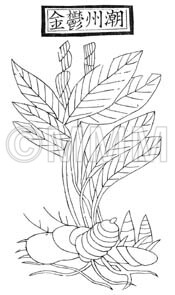Crude drug sample data base
※Click on the image to enlarge it.
The capital city, provincial capital city or the representative
location of its administrative area is indicated.
location of its administrative area is indicated.
Production area information
Union of Myanmar
https://ethmed.toyama-wakan.net/img/pin_san.png
34.6937378
135.50216509999996
Collection information
Japan,Osaka Pref.
https://ethmed.toyama-wakan.net/img/pin_nyu.png
Scientific information data base
| Common name | 鬱金, Yujin, Curcumae Longae Rhizoma (JP18), (CP2020), Turmeric (JP18), (CP2020) | |||||
|---|---|---|---|---|---|---|
| Synonyms | 姜黄 | |||||
| crude drug image |
| |||||
| Original plant name | Curcuma longa Linn., (Ukon) | |||||
| original plant image |
| |||||
| Family name | Zingiberaceae | |||||
| Used part | rhizome | |||||
| Quality for selection | Good Yujin is stiff and the outside is bright champagne. The cross-section is dense yellow. It has a strong odour and pungency. (TN) | |||||
| Official compendium | JHMC (1989), JP XVIII, CP (2020 ed.) | |||||
| Clinical application | For normalizing the gallbladder function, as an amaroid stomachic, Yujin is applied for hepatitis, cholangitis, cholelithiasis and catarrhalis jaundice. As hemostatic and stimulant of menstrual discharge, it is also applied for hematemesis, hematuria, menopausal pain, hypochondrial pain and abdominal pain. | |||||
| Medical system | Traditional Chinese medicine | |||||
| Drug effect in traditional medicine | Traditional classification | Drugs for invigorating blood circulation | ||||
| Beneficial effect | Curcumae Longae Rhizoma (Jianghuang): [Property and Flavor] Warm; pungent, bitter. [Meridian Tropism] Spleen and liver meridians. [Actions] Stabbing pain in the chest and hypochondrium, chest impediment and heart pain, dysmenorrhea, amenorrhea, abdominal masses, aching pain in the shoulder and arm caused by wind-dampness, swelling and pain caused by traumatic injuries. | |||||
| Chemical constituent | Monoterpenoids C. longa (*C1): 1,8-Cineole, d-alpha-Phellandrene C. wenyujin (*C1): Camphor, Camphene Sesquiterpenoids C. longa (*C1): alpha-Turmerone, beta-Turmerone, d-ar-Turmerone, Zingiberene C. wenyujin (*C2): Curcumol, Curdione C. wenyujin (*C3): Wenjiine Diarylheptanoids C. longa (*C1): Curcumin, Demethoxycurcumin, Bisdemethoxycurcumin | |||||
| Chemical structure |
※画像をクリックすると、拡大して表示されます。 | |||||
| Pharmacological effect | Hypersecretion and enhancing stomach movement(essential oil).Hypercholeresis and enhancing bile excretion(curcumin, turmerone, cineole).Antiinflammation(curcumin).Antitumor(curcumin, ar-turmerone).Choleresis(curcumin, cineole). | |||||
| DNA sequence | AB047718, AB047738, AB047710, AB047731, AB047723, AB047746 (*G1-G3); Traditioal Medical & Parmaceutical Database. | |||||
| Classical reference (Chinese Herbal Classic "Zhenglei bencao") |  ※Click this image to see the actual image ※Click this image to see the actual image | |||||
| Disease | Acute hepatitis, Chronic hepatitis, Cholelithiasis, Jaundice, Pain due to flatulence of hypochondrium, Anginal pain, Distending pain in the breast, Abdominal pain, Menorrhalgia, Hematemesis, Nasal hemorrhage, Hematuria, Disturbance of consciousness, High fever, Epileptic seizure, Frenzy | |||||
| Formulation | rarely used in formula | |||||
| Related drugs | Huangsiyujin, Wenyujin, Lusiyujin, Guiyujin, Pianjianghuang, Wenezhu, Pengezhu, Guangxiezhu, Haruukon. | |||||
| References | JP18: The 18th edition of the Japanese Pharmacopoeia. CP2020: Pharmacopoeia of the People's Republic of China 2020 edi. C1) The Encyclopedia of Wakan-Yaku with Color Pictures, Vol. I, pp 176-179. C2) Chem.Pharm.Bull.,39,843(1991). C3) Chem.Pharm.Bull.,39,854(1991). S1) Biol.Pharm.Bull.,24: 1389-1394(2001). S2) Biol.Pharm.Bull.,25: 1593-1599(2002). E1) Biol.Pharm.Bull.,26: 1135-1143(2003). S3) Biol.Pharm.Bull.,27: 144-146(2004). | |||||
| Remarks | In China, the underground part of genus Curcuma is divided into rhizome and tuber. They are named differently. The rhizome of Curcuma longa L. is called Jianghuang and its tuber is called Huangsiyujin. In the case of the rhizome of C. wenyujin Y. H. Chen et C. Ling, the one which is cut longitudinally is called Pianjianghuang, the whole rhizome is called Wenezhu and the tuber is called Wenyujin. The rhizome of C. phaeocaulis Val. is called Pengezhu and the tuber is called Lusiyujin. The rhizome of C. kwangsiensis S. G. Lee et C. F. Liang is called Guangxiezhu and the tuber is called Guiyujin. According to "The Pharmacopoeia of People's Republic of China," the nature and flavor of Jianghuang (Curcumae Longae Rhizoma) is pungent, bitter in flavor and warm in property. It has the effect of eradicating blood stasis with drastic drugs, promoting the normal flow of vital energy, stimulating menstrual discharge in the case of pathological amenia and relieving pain. The literature also points out that Pianjianghang has the same nature and beneficial effects as Jianghuang. At the same time, the nature and flavor of Chinese yujin (Curcumae Radix), including Huangsiyujin, Wenyujin, Lusiyujin and Guiyujin, is pungent, bitter in flavor and cold in property. It has the effect of promotiong the normal flow of vital energy, eliminating the blood stagnation and activating the blood, removing evil heat to cause resuscitation and normalizing functioning of the gallbladder and curing jaundice. It is applied for amenorrhea and dysmenorrhea, distention and pain of the chest and abdomen, stabbing pain, loss of consciousness caused by febrile disease, epilepsy and derangement, jaundice and red urine. In Japan, Chinese Curcuma drugs are available, the rhizome of C. longa is called Ukon (Curcumae Longae Rhizoma) and the tuber is called Gyokkin or Sengyokkin (Curcumae Longae Radix). Therefore, Japanese "Ukon" is Chinese "Jianghuang." Gyokkin in Japan may have four kinds of original plants since Yujin in China has four originals. In Okinawa and Kagoshima prefectures, C. longa and C. aromatica Salisb. (Jap. name: Haruukon) are cultivated. Each rhizome of them is in a demand as health food. Yujin is used as raw material for curry powder, artificial color for food, indicator (Curcuma paper) and Curcuma tincture. | |||||
| Last renewal date | 2023/04/10 | |||||














